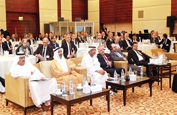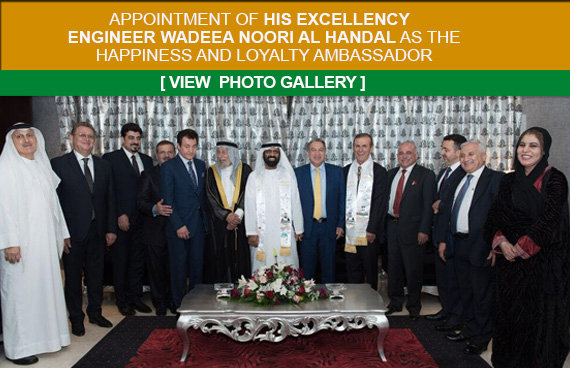 Energy Minister Opens ‘Iraq Energy Projects Conference’ in Dubai
Energy Minister Opens ‘Iraq Energy Projects Conference’ in Dubai
Thursday, February 27, 2014
H.E. Suhail Bin Mohammad Bin Faraj Al Mazrouei, Minister of Energy, stressed that the topic of energy projects in Iraq is of importance to the energy sector regionally and globally “because Iraq is one of the most important energy exporting Arab countries worldwide and possesses large reserves of natural wealth” added the Minister.
This was mentioned during the opening address delivered by H.E. Rashid Abdulla Al Matroushi, Assistant Undersecretary for Corporate and Support Services Affairs at the Ministry, on behalf of His Excellency the Minister of Energy.
The Energy Minister’s Address emphasised that although UAE’s relations with the Republic of Iraq are deep-rooted and diverse, relations may be more evident in the energy sector since both UAE and Iraq are among the largest oil producers in the world and are also members of the Organization of the Petroleum Exporting Countries (OPEC), seeking to increase their oil production capacity to keep pace with local and global growth.
His Excellency also discussed the UAE’s general policy in the field of energy, noting that although UAE is among major oil exporting countries and a member of both OPEC and OAPEC organisations, it has taken a decision to adopt a policy of diversification of energy sources in a manner that is consistent with its geographic and climatic nature.
This policy, added the Minister, has earned the UAE an advanced position among countries of the region. The UAE has been the first to utilize solar energy applications for generation of electric power, in addition to promotion of know-how and establishment of research centres and specialised institutes in this field. The opening of ‘Shams 1’ station in the western region in March 2013 with a capacity of 100 Megawatts comes as further evidence of the UAE’s firm resolve to use solar energy.
H.E. also stated that in a related context, UAE’s decision to utilise nuclear energy for electric energy production represents another element of the policy of diversification of energy sources. His Excellency’s address noted that electricity production is expected to begin in 2017 in the first reactor at Baraka nuclear energy plant and that total production in the four reactors is expected to reach 5600 Megawatts by 2020.
Further, the UAE seeks to promote the stability of global markets by increasing UAE’s crude oil production capacity up to 3.5 million barrels per day by 2017. This trend demonstrated by the UAE and other oil exporting countries to invest in increasing production capacity has come as a result of the increase in global growth, population growth and the consequential increase in energy demand, especially in the emerging economies of Asia and South America, as well as the rapid economic growth in the region.
His Excellency stressed that the demand for crude oil and natural gas is still high and that collectively they accounted for 57% of the global consumption of primary energy in 2012. Studies also indicate that there is a potential for increase in the demand for crude oil from 89 million barrels to 104 million barrels by 2030.
“During recent years, new technology has led to a revolution in the production of oil and gas from unconventional sources with increased debating over the potential effects of the production of shale oil and gas on conventional oil and gas sources. This caused concern among conventional producers regarding the potential impact on the prices of conventionally produced oil and gas, particularly gas prices”.
“In my view this concern is somewhat exaggerated, especially with respect to raw oil. The rise in the cost of production of shale oil and its consequential environmental impacts indicate that it may face great challenges or may be restricted to a narrower scope in a manner that does not allow it to compete with conventional oil production.” said His Excellency the Minister of Energy, adding that “As to the potential impact of shale gas on conventional gas prices, I believe that the picture is somewhat different. Conventional gas prices have risen during the last four years due to increased demand on natural gas and the attempt of some producers to link natural gas prices to raw oil prices”.
His Excellency emphasised that shale gas production has helped to meet part of the increasing demand for natural gas which may affect the sale prices for gas in long-term contracts, especially in the event of commencement of exporting from North America or in case of overcoming impediments preventing exploitation of shale gas in other parts of the world.
“This development in the production of shale gas, if it is destined to continue, shall have a positive impact on the stability of gas prices, in a manner that facilitates wider usage of gas in various areas such as increasing its use in the production of electricity or in the transportation sector”.
His Excellency added that “In the UAE we seek to use new technologies and develop laws and specifications to reduce waste in electricity and water usage. We seek progress in this field guided by best international practices”.
“The future challenges in the region lie in creating a balanced system of energy generation sources to achieve sustainability and legislation of optimum use of resources and adopting a policy of rationing subsidy for such basic services, which will eventually lead to reduced consumption and conservation of natural resources“.
“The UAE has been especially keen on foreign investment in the field of energy, especially in the Republic of Iraq, in the areas of oil, gas and electric power generation”.
His Excellency concluded his address by saying that “We, in the Ministry of energy, encourage our investment companies to invest in the countries of the region, especially Arab countries, to convey expertise and develop projects. We hope that such investments will grow and bring benefits to all. We are also prepared to share with our brethren in Iraq, our expertise in the enactment of laws and legislations regulating the energy sector”.





![More than [37] billion dollars, the volume of investment in Kurdistan](https://iraqisbusinesscouncil.com/wp-content/uploads/2014/12/0xtLHyQ5DSC_0040-88x67_c.jpg)

